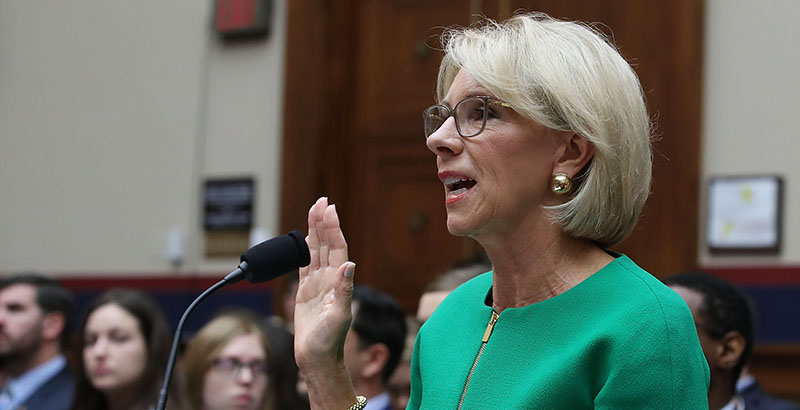Civil Rights Groups Are Pressing Betsy DeVos to Affirm a Supreme Court Decision That Protects Undocumented Students’ Education. Here’s the Backstory on Plyler v. Doe

Last week, Secretary of Education Betsy DeVos asserted before a House committee that reporting undocumented students to authorities is “a school decision,” prompting impassioned retorts from civil rights groups, lawyers, and educators and a co-signed letter Tuesday from more than 170 organizations demanding clarification of her comments.
The issue at hand is Plyler v. Doe, a 1982 Supreme Court case that established the precedent that all children — independent of legal status — have the right to a public education. As education powerhouses such as New York City Schools Chancellor Richard Carranza and former education secretary John King Jr. pointed out last week, this means schools cannot deny their enrollment, or adopt policies that might discourage or hinder enrollment.
“It is imperative that you immediately make clear publicly … [that] schools may not do anything to deny or chill access to that constitutional right,” the letter read. DeVos has not made a public clarification so far, though department spokeswoman Elizabeth Hill told outlets such as NBC News last week following mounting criticism that “the secretary’s position is that schools must comply with Plyler and all other applicable and relevant law.”
While scores of recent articles have name-dropped Plyler v. Doe, the case’s backstory remains less known.
The story of the case began when the Texas legislature revised the state’s education laws in 1975, withholding state funds from local school districts for students enrolled who were not “legally admitted” into the U.S. and authorizing schools to bar such students. In response, Tyler Independent School District in northeast Texas — under the direction of superintendent James Plyler — adopted a policy two years later that required each undocumented student to pay an annual tuition of $1,000.
As a result, a group of children of Mexican origin were unable to attend school.
A class action lawsuit in U.S. district court, brought on behalf of four families, followed. The court allowed the families to be identified by pseudonyms — hence, “John Doe” — and deduced that the statute didn’t serve “the purpose or effect of keeping illegal aliens out of the State of Texas” or improve the quality of education. The school district took the case to an appeals court, and it later filed a petition with the U.S. Supreme Court.
The Supreme Court’s 5–4 decision on June 15, 1982, upheld prior rulings and found the policy in violation of the 14th Amendment’s Equal Protection Clause, which declares that “no State shall ‘deny to any person within its jurisdiction the equal protection of the laws.’ ” Many justices also believed the revisions imposed “a lifetime hardship” on children who had no control over their circumstances, and that “by denying these children a basic education, we … foreclose any realistic possibility that they will contribute in even the smallest way to the progress of our Nation.” The dissenting opinion suggested that the court “abuses” the 14th Amendment, adding, “By definition, illegal aliens have no right whatever to be here, and the state may reasonably, and constitutionally, elect not to provide them with governmental services.”
For attorneys Jessica Hanson and David Hausman, the ruling made no exceptions: Reporting undocumented students produces a “chilling effect” and can deter parents from enrolling their children — thus violating federal law. Hausman, a Skadden Fellow with the ACLU immigrants’ rights project, noted that the precedent is bolstered by 2014 Education Department guidance; a 2012 federal court ruling that deemed the Alabama practice of collecting and reporting students’ immigration status unlawful; and the Family Educational Rights and Privacy Act (FERPA), which prohibits schools from disclosing any student’s personal information to outside parties without a judicial court order.
Someone who is reported, in fact, could feasibly sue the school and bring a case to court, Hanson added.
“The biggest concern is that families are going to hear [DeVos’s statement] and pull their kids out of school,” said Hanson, a Skadden Fellow for the National Immigration Law Center. She cited an April scenario in Tennessee in which more than 500 students skipped school the day after a local Immigration and Customs Enforcement raid. “With every wave of immigration enforcement, we have seen that. It is dangerous when leaders in our government make statements that directly cause that chilling effect.”
Although immigration and the rights of undocumented immigrants have been a heated sociopolitical issue for decades, tensions have festered under President Donald Trump’s administration. The president has referred to some immigrants as drug dealers and “rapists,” and he has unsuccessfully tried to end the Deferred Action for Childhood Arrivals program, which protects nearly 700,000 undocumented people from deportation. Recent MS-13 gang violence in Long Island, New York, has also fueled Trump’s efforts to curtail immigration.
Nonetheless, Hausman stressed, the right of undocumented students to a public education is still very much protected.
“The most important thing is to counter the message of fear … and to really emphasize that statements [like DeVos’s] are flatly contradicted by the administration’s own policy,” he said. “School is still a safe place for undocumented students.”
Get stories like these delivered straight to your inbox. Sign up for The 74 Newsletter

;)
